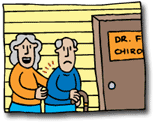|
Actually,
the correct phrase in this case might be "falling without
chiropractic," at least if the results of a recent study by
a team of Australian researchers are accurate.
The elderly have a lot to put up with: eyes that may not
see as clearly as when they were younger; minds that might
not be as lucid as they once were; and bones that are weaker
and more prone to breaking. In fact, falls are the sixth leading
cause of death among the elderly population. Does the spine
play a role in preventing falls?
 Researchers recently examined common causes of falls and
possible interventions, including the potential influence
of a healthy spine. The most common fall-related injuries
are fractures, especially of the femur, neck and soft tissue.
Recent studies have yielded links from the degenerative spine
to balance disturbances, the neck and verticality; and research
is ongoing to determine whether the cervical spine is associated
with balance that may be slightly "off" when a fall occurs. Researchers recently examined common causes of falls and
possible interventions, including the potential influence
of a healthy spine. The most common fall-related injuries
are fractures, especially of the femur, neck and soft tissue.
Recent studies have yielded links from the degenerative spine
to balance disturbances, the neck and verticality; and research
is ongoing to determine whether the cervical spine is associated
with balance that may be slightly "off" when a fall occurs.
Researchers suggest simple activities may serve as tests
of patient functional performance. These include sitting,
standing, reaching, leaning over, looking over the shoulder,
turning in a complete circle and stepping, and a simple gauge
of leaving a chair, walking 3 meters, and returning to the
chair.
Aside from the normal challenges facing the elderly, one
precaution is in order: Seek a spine specialist in order to
maintain your back, posture and equilibrium. And what better
spine specialist than a doctor of chiropractic? Your chiropractor
can advise you on the best ways to prevent yourself from losing
your balance - and possibly more.
To learn more about ways to stay healthy into the golden
years, go to www.chiroweb.com/find/archives/senior.
Reference:
Walsh JM, Polus BI, Webb MN. The role of the cervical spine
in balance and risk of falling in the elderly. Chiropractic
Journal of Australia March 2004;34(1):19-22.
|



